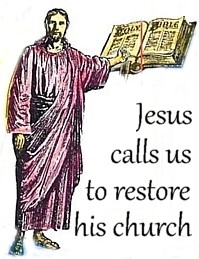
The Church Over 2000 Years
—A chart of church history
A chart showing the rather sad history of the church since its establishment by Jesus. This chart is very brief. It's a simple overview of 2000 years of church history.
AD 1 The early church established
Jesus lived on earth. He was crucified, buried, arose from death, appeared to many disciples, ascended into heaven, sat with his Father on his Father’s throne.
Jesus established his church worldwide.
The scriptures of the church were written, preserving the gospel.
Matthew 16:18, Colossians 1:23, Ephesians 2:19-20
AD 100 Apostasy began as predicted
Matthew 24:24, 2Thess 2:3-11, IJohn 2:18, 1Timothy 4:1
AD 500 Dark Ages
The Dark Ages followed the fall of the Roman Empire
However the scriptures were not lost. Even if they were not widely distributed and practised, they were preserved. The church of our Lord could have been formed anywhere by anyone following the information these scriptures provided.
AD 1000 The first denominations
The first two denominations came into existence: the Roman Catholic, and the Eastern Orthodox.
AD 1500 Protestant denominations
Protestantism
Protestant denominations began to form. These were the unfortunate outcome of an attempted “reformation” of the Roman church.
Latter Day Sects
Later, a rash of prophecy movements sprang up, and many “latter day prophets” predicted the end of the world. However, their predictions, like their teachings, were false.
Modernism
So called “modernism” took hold of many churches, denying the resurrection and divinity of Christ, Biblical miracles, creation, and the sexual morality taught in the gospel.
Pentecostalism
In the 20th century, the so called “Pentecostal” movement or “charismatic movement” invaded most denominations with its false miracles.
Restoration Movements
Amid all this confusion, there were movements to restore the church founded in the first century and to be neither Protestant nor Catholic, nor denominational, but simply Christians. The scriptures were more widely read, discussed, and followed —instead of creeds. However some of these movements split. They degenerated into new denominations and lost their defining principle.
AD 2000 The future
A new movement seems to be gathering momentum. It's agenda is to form churches outside of denominational structure and tradition while still retaining a connection with a denomination and its doctrine. Most of these churches are trying to adapt a denominational church to the 21st Century. The real need is to restore the church that Jesus built in the first century. Hopefully the movement will turn that way.